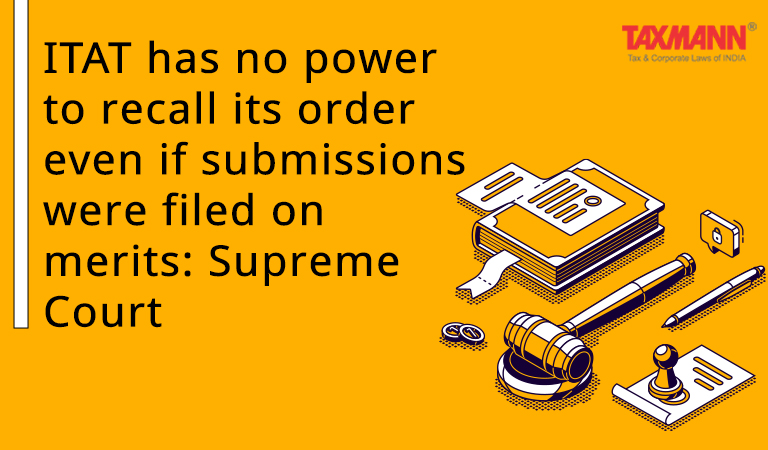ITAT has no power to recall its order even if submissions were filed on merits: Supreme Court
- News|Blog|Income Tax|
- 2 Min Read
- By Taxmann
- |
- Last Updated on 7 December, 2021

Case Details: CIT v. Reliance Telecom Ltd. - [2021] 133 taxmann.com 41 (SC)
Judiciary and Counsel Details
-
- M.R. Shah and B.V. Nagarathna, JJ.
Facts of the Case
The assessee entered into a Supply Contract with Ericsson A.B. It filed an application under section 195(2) before the Assessing Officer (AO), to make payment to the non-resident company for the purchase of software without TDS. It was contended by the assessee that it was for the purchase of software and since Ericsson A.B. had no permanent establishment in India and terms of the DTAA, the amount paid is not taxable in India.
The AO passed an order rejecting the assessee’s application under section 195(2). Assessee, after deducting the tax, appealed before the CIT(A). CIT(A) held in favour of assessee. On further appeal, ITAT upheld the view taken by AO and reversed the order of CIT(A). Against the ITAT order, the assessee filed a miscellaneous application for rectification under section 254(2).
The ITAT allowed the miscellaneous application filed under section 254(2) and recalled its original order. Feeling aggrieved and dissatisfied with the order passed by the ITAT, revenue preferred appeal before the High Court, which was dismissed. Thus, revenue filed the appeal before the Supreme Court.
Supreme Court Held
The Supreme Court held that the order passed by the ITAT recalling its earlier order is beyond the scope and ambit of the powers under section 254(2). In exercise of powers under section 254(2), the ITAT may amend any order passed by it to rectify any mistake apparent from the record only. The Tribunal cannot revisit its earlier order and go into detail on merits.
The powers under section 254(2) are only to correct and/or rectify the mistake apparent from the record. Merely because the assessee might have filed detailed submissions, it does not confer jurisdiction upon the ITAT to pass the order de hors Section 254(2).
In the instant case, a detailed order was already passed by the ITAT, which was held in favour of the revenue. Therefore, the said order could not have been recalled by ITAT in the exercise of powers under section 254(2). If the assessee believed that the order passed by the ITAT was erroneous, either on facts or in law, the only remedy available was to prefer the appeal before the High Court.
Disclaimer: The content/information published on the website is only for general information of the user and shall not be construed as legal advice. While the Taxmann has exercised reasonable efforts to ensure the veracity of information/content published, Taxmann shall be under no liability in any manner whatsoever for incorrect information, if any.

Taxmann Publications has a dedicated in-house Research & Editorial Team. This team consists of a team of Chartered Accountants, Company Secretaries, and Lawyers. This team works under the guidance and supervision of editor-in-chief Mr Rakesh Bhargava.
The Research and Editorial Team is responsible for developing reliable and accurate content for the readers. The team follows the six-sigma approach to achieve the benchmark of zero error in its publications and research platforms. The team ensures that the following publication guidelines are thoroughly followed while developing the content:
- The statutory material is obtained only from the authorized and reliable sources
- All the latest developments in the judicial and legislative fields are covered
- Prepare the analytical write-ups on current, controversial, and important issues to help the readers to understand the concept and its implications
- Every content published by Taxmann is complete, accurate and lucid
- All evidence-based statements are supported with proper reference to Section, Circular No., Notification No. or citations
- The golden rules of grammar, style and consistency are thoroughly followed
- Font and size that’s easy to read and remain consistent across all imprint and digital publications are applied



 CA | CS | CMA
CA | CS | CMA
